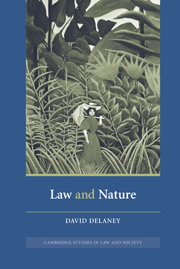Book contents
- Frontmatter
- Contents
- Acknowledgments
- Part I Situating nature
- 1 Introduction: the pragmatics of nature and the situation of law
- 2 The nature of modern political discourse: doing things with nature
- 3 The natures of scientific discourse
- 4 The natures of legal discourse
- 5 The natures of legal practice
- Part II Rendering nature
- Part III Judging nature
- References
- Index
2 - The nature of modern political discourse: doing things with nature
Published online by Cambridge University Press: 22 July 2009
- Frontmatter
- Contents
- Acknowledgments
- Part I Situating nature
- 1 Introduction: the pragmatics of nature and the situation of law
- 2 The nature of modern political discourse: doing things with nature
- 3 The natures of scientific discourse
- 4 The natures of legal discourse
- 5 The natures of legal practice
- Part II Rendering nature
- Part III Judging nature
- References
- Index
Summary
If “nature” is, among other things, a culturally created device that is used to make sense of entities, events, and states of affairs, what kind of sense does it make? What are some of the meanings that we pour into the category and then project onto reality? The aim of this chapter is simply to survey some of the tasks that “nature” is called upon to accomplish. Among its most basic tasks is to differentiate humanity or humanness from the remainder of totality (or what in other frameworks is called “creation”). Nature is used to provide a contrastive background against which various figures of “the human” are legible. To that end, “nature” is commonly employed to signify negativity as against uniquely human positivities associated with “mind,” and to signify a domain of necessity against distinctively human capacities for freedom, choice, or creativity. Using “nature” in these ways often positions it in relation to humanness or humanity and these relationships are commonly conceptualized in terms of control, knowledge, and limits. I shall discuss each of these in turn. In subsequent chapters I shall look more closely at the sort of “humans” that may be fabricated. The chapter is by no means comprehensive. It is admittedly partial and is deliberately suggestive. What I want to do is in a very general way introduce some of the things that “nature talk” can do – or, more accurately, what can be done with it – in the making of sense.
- Type
- Chapter
- Information
- Law and Nature , pp. 28 - 53Publisher: Cambridge University PressPrint publication year: 2003



